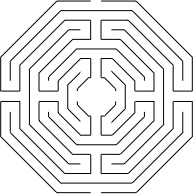Communitas is the second of the products of ritual.
It is easy to see why this is so: for a public ritual such as 3 Old Men, people come together to participate. They have agreed, corporately, that this action is good and appropriate and that it must be done.
And by doing so, they bond themselves into a community. They are part of something larger than themselves. Indeed, they have crossed that line of liminality into something universal.
Note that this communitas is not tribalism (although certainly tribalism uses ritual to reinforce itself). Those who commit to a ritual come to understand that they are part of the Order created by the ritual, and more importantly, the others in the ritual are part of the same Order. They are a Community.

With the 3 Old Men, we offer the Burning Man community a ritual of passage: a hero’s journey from the outside to the center and the return, ending with an agon that assumes meaning according to the metaphor constructed by the participant.
One thing that interests me about our ritual is that it differs from the experience of a regular labyrinth. A regular labyrinth offers one path in and one path out, usually the same path; the ritual is a meditation, seeking meaning and metaphor in the walk, undisturbed by conscious choices. In our labyrinth, on the other hand, choice becomes an integral part of the journey. I don’t know if you’ve traced the pattern, but each of the four paths branches twice before returning to itself. It is not a maze; there are no dead ends, and you cannot get “lost,” but you must at least pick a path (twice) on your journey to the center—and that’s after picking which entrance to use.
Once in the center, choosing an exit reverses the process, only this time, your choice involves a choosing, if that makes sense: more than the direction you exit, there are officiants standing outside three of the four exits, each offering a different agon. Indeed, choosing to undergo an agon or not becomes a major part of the ritual.
More: the question arises of what happens when you have chosen to exit towards the officiant who offers a blessing, for example, and while you are making the journey outward, the officiants make their procession to another entrance. Do you continue your path, exiting to an agon (or the absence of one) different from the one you had hoped to encounter? Do you stop, return to the center, and exit to your original choice? Can you do that?
Thus those who participate in the 3 Old Men’s ritual will find themselves involved in a communitas which they may not completely understand—it makes no demands of them to join a “community,” but it does lead them into a confrontation with a structure offered by three mysterious elders, a structure that asks them to regard the choices they make—and the choosing—and to construct their own meaning of those choices. It offers them a brief liminal experience in the middle of the hurly-burly of Burning Man, and my hope is that that’s a good thing.
Tomorrow: Transformation.